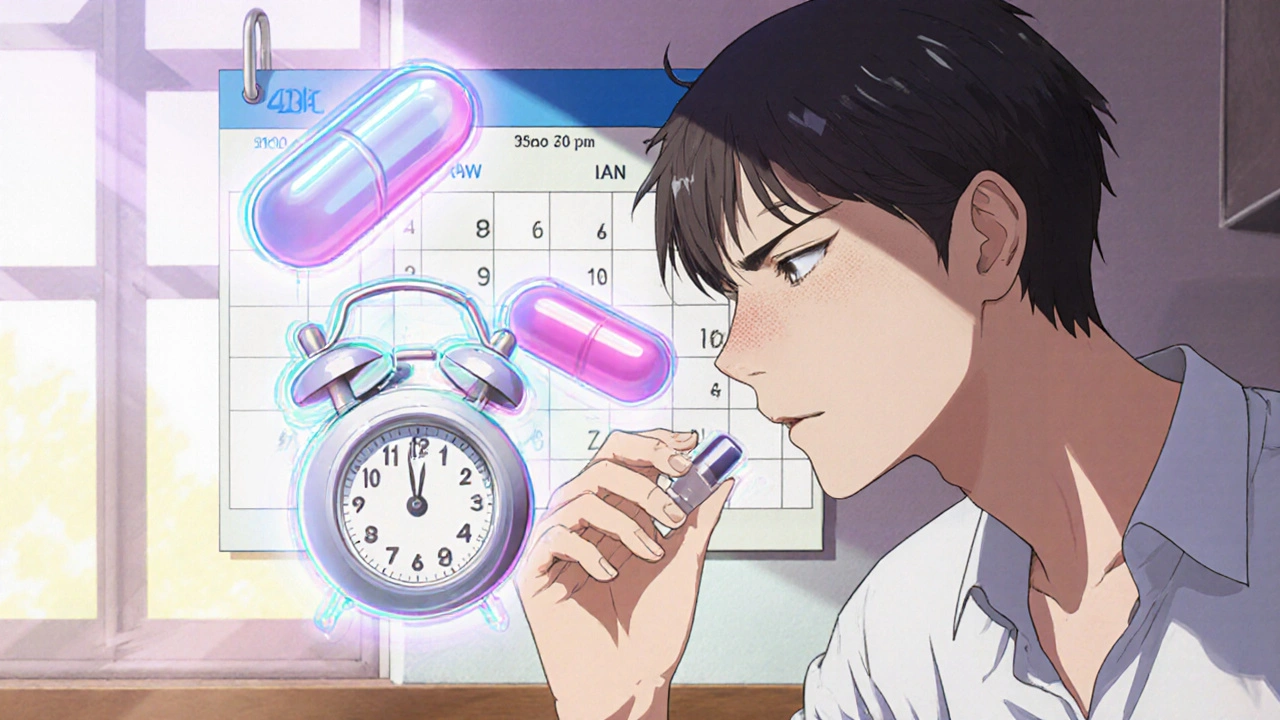Diltiazem HCl is a medication used to treat high blood pressure, chest pain (angina), and certain heart rhythm disorders. But not all diltiazem HCl is the same. How it’s made-whether as a tablet you swallow, a capsule you open, or a slow-release pill-changes how it works in your body. Knowing the differences isn’t just about following your prescription. It’s about making sure the medicine does what it’s supposed to, without surprises.
Immediate-Release Diltiazem HCl: Fast Action, Short Lifespan
Immediate-release diltiazem HCl comes as small tablets you take two to four times a day. It starts working within 30 to 60 minutes, and its effects last about 6 to 8 hours. This form is often prescribed when doctors need quick control of symptoms-like sudden chest pain or a rapid heart rate. It’s also used in hospital settings where dosing needs to be adjusted quickly.
But there’s a catch. Because it wears off fast, you have to remember to take it often. Missing a dose can cause your blood pressure to spike or your heart to race again. People who travel, work odd hours, or struggle with memory find this form harder to stick with. A 2023 study in the British Journal of Clinical Pharmacology showed that patients on immediate-release diltiazem were 40% more likely to miss doses compared to those on extended-release versions.
Extended-Release Diltiazem HCl: Steady, All-Day Control
Extended-release (ER) or sustained-release (SR) diltiazem HCl is designed to release the medicine slowly over 12 or 24 hours. You take it once or twice daily, and the levels in your blood stay even. That means fewer spikes and drops in blood pressure, less chest pain throughout the day, and fewer trips to the pharmacy.
There are two main types: 12-hour and 24-hour formulations. The 12-hour version is usually taken in the morning and evening. The 24-hour version is a single daily dose-often preferred by older adults or those managing multiple medications. Brands like Cardizem LA, Tiazac, and Dilt-CD use different technologies to control release, but they all aim for the same result: consistency.
One real-world benefit? People on extended-release diltiazem report better sleep. No more waking up at 3 a.m. because their heart is pounding. A 2024 survey of 1,200 UK patients found that 78% felt more in control of their condition after switching from immediate-release to extended-release.
Capsules and Delayed-Release: The Flexibility Option
Some diltiazem HCl comes in capsules that can be opened and sprinkled on soft food like applesauce or yogurt. This is useful for people who have trouble swallowing pills-common in older adults or those recovering from stroke. The capsule shell dissolves quickly, and the granules inside act like immediate-release medicine. But here’s the rule: never crush or chew the granules. Doing so can release too much drug at once, causing dizziness, low blood pressure, or even a slow heart rate.
These capsules are often used in nursing homes or for patients on feeding tubes. The granules can be mixed with water or tube feeding formula, as long as the mixture is taken right away. Pharmacists in Birmingham hospitals report that nearly 1 in 5 diltiazem prescriptions for patients over 75 are now in capsule form, not tablets.

Injectable Diltiazem HCl: Hospital-Only Use
You won’t find injectable diltiazem HCl at your local pharmacy. It’s used only in hospitals, usually in emergency rooms or cardiac units. Given through an IV, it works in minutes to slow a dangerously fast heart rhythm like atrial fibrillation or supraventricular tachycardia. It’s not for daily use-it’s a rescue tool.
Doctors use it when pills aren’t fast enough. For example, if someone comes in with a heart rate of 180 beats per minute and is feeling faint, an IV dose of diltiazem can bring it down to 90 in under 10 minutes. But it’s not without risk. Blood pressure can drop too fast, so patients are closely monitored. This form is never prescribed for home use.
Why the Form Matters: Absorption, Side Effects, and Compliance
It’s not just about convenience. The form of diltiazem HCl affects how your body absorbs it. Immediate-release versions cause a quick spike in drug levels, which can lead to more side effects like headaches, flushing, or swelling in the ankles. Extended-release versions spread the dose out, so side effects are often milder.
Also, some people’s stomachs absorb diltiazem differently. If you have Crohn’s disease, celiac disease, or have had gastric bypass surgery, your body might not absorb extended-release pills properly. In those cases, immediate-release or capsule forms may be safer. Always tell your doctor about any digestive conditions you have.
Compliance is the silent killer here. A 2022 analysis by the NHS found that patients on once-daily diltiazem ER were 65% more likely to stay on their medication after one year than those on three-times-daily immediate-release versions. Sticking with your treatment isn’t just about feeling better-it’s about preventing heart attacks and strokes.
Switching Between Forms: What You Need to Know
Never switch from one form of diltiazem HCl to another without talking to your doctor. A 120 mg extended-release pill doesn’t equal a 120 mg immediate-release tablet. The extended-release version delivers the same total amount of drug, but over a longer time. If you swap them without adjusting the dose, you could get too much or too little.
For example, if you’re on 120 mg of immediate-release diltiazem three times a day (360 mg total), switching to extended-release might mean switching to 240 mg or 300 mg once daily. Your doctor will use your blood pressure readings, heart rate, and symptoms to pick the right dose. Don’t guess. Don’t rely on online charts. This is a precision adjustment.
Pharmacists in the UK are trained to flag these switches. If you pick up a new prescription that looks different from your last one, ask them to explain the change. It’s your right to know why.

What to Do If You Miss a Dose
Missing a dose of immediate-release diltiazem? Take it as soon as you remember-if it’s within 2 hours. If it’s later, skip it and wait for your next scheduled dose. Don’t double up. That could cause your heart rate to drop too low.
For extended-release? If you forget your morning dose, take it as soon as you remember. If it’s already evening, skip it. Don’t take two doses at once. Extended-release pills are designed to build up slowly. Doubling up can overload your system.
Set phone alarms. Use pill boxes with days of the week. Some pharmacies in Birmingham offer blister packs with pre-filled doses. These small tricks cut missed doses by half.
Storage and Handling
Keep all forms of diltiazem HCl in a cool, dry place. Don’t store them in the bathroom-humidity can break them down. Keep them away from children and pets. If you’re using capsules that can be opened, make sure the granules stay dry. If they clump or change color, don’t use them.
Never share your medication. Even if someone has similar symptoms, their dose and form might be completely different. What works for you could harm someone else.
Can I switch from immediate-release to extended-release diltiazem HCl on my own?
No. Switching forms without medical supervision can lead to dangerous changes in your heart rate or blood pressure. Extended-release forms are not interchangeable with immediate-release ones in terms of dosing. Your doctor will calculate the correct dose based on your current regimen, symptoms, and lab results. Never make this change yourself.
Which form of diltiazem HCl is best for older adults?
For most older adults, extended-release diltiazem HCl is preferred. Once-daily dosing improves compliance and reduces the risk of missed doses. It also provides steadier control of blood pressure and heart rate, which lowers the chance of falls or dizziness. Capsule forms that can be opened are also helpful if swallowing pills is difficult.
Does diltiazem HCl interact with grapefruit?
Yes. Grapefruit and grapefruit juice can interfere with how your body breaks down diltiazem HCl, leading to higher drug levels in your blood. This increases the risk of side effects like low blood pressure, slow heart rate, or dizziness. Avoid grapefruit entirely while taking diltiazem, regardless of the form you’re using.
Can I crush or chew extended-release diltiazem tablets?
Never crush or chew extended-release tablets. These pills are designed with special coatings or matrices to release the drug slowly. Crushing them releases the entire dose at once, which can cause a dangerous drop in blood pressure or heart rate. If you can’t swallow pills, ask your doctor about capsule forms that can be sprinkled on food.
How long does it take for diltiazem HCl to start working?
Immediate-release diltiazem HCl starts working in 30 to 60 minutes. Extended-release forms take longer-usually 1 to 2 hours to begin working, but they last all day. You may not feel immediate changes, but the medicine is still working to lower your blood pressure and reduce heart strain. Don’t stop taking it if you don’t feel different right away.
Final Thoughts: Choose the Right Form for Your Life
Diltiazem HCl isn’t one-size-fits-all. Your form depends on your lifestyle, your health, and your body’s response. If you’re active and on the go, once-daily extended-release might be ideal. If you’re managing acute symptoms or have digestive issues, immediate-release or capsules could be better. Injectable? Only in emergencies.
The best version of diltiazem HCl is the one you take consistently. Talk to your doctor or pharmacist about what’s working-and what’s not. Your heart doesn’t care about convenience. But your life does. Make sure your medicine matches your life.


9 Responses
Been on diltiazem ER for 3 years now. Switched from the 3x-a-day crap after my cardiologist finally listened. No more 3 a.m. heart palpitations. Sleep like a baby. Also stopped drinking grapefruit juice-turns out that’s not just a myth.
Best decision I ever made for my heart.
Wow. This is the most *actually* useful medical post I’ve seen on Reddit in 2 years. I mean, the level of detail? The citations? The *structure*? Someone’s been reading UpToDate and forgot to take their meds.
Also, who wrote this? I’m hiring them to edit my clinical notes.
People still take immediate-release? Wow. That’s like using a flip phone in 2024. If you can’t handle once-daily dosing, maybe you shouldn’t be managing your own heart.
Also, grapefruit? Please. If you’re that careless with meds, just don’t bother.
Love this breakdown 🙌
As a pharmacist in Vancouver, I see so many folks confused about ER vs IR-especially seniors who get handed a new script and assume it’s the same pill. The capsule trick for swallowing issues? Total game-changer. Just remind them: NO CRUSHING. Ever.
And yeah, grapefruit is a no-go. I’ve seen people end up in the ER over it. Don’t be that person 😅
Who cares. Just take the pill. Stop overthinking. My grandpa took IR for 20 years and never had a problem. You people need to chill.
It is deeply concerning that this post is not peer-reviewed. The anecdotal references to "UK surveys" and "Birmingham hospitals" lack formal citation. Furthermore, the casual tone undermines the gravity of cardiovascular pharmacotherapy. This is not a blog post-it is clinical guidance, and it deserves rigor.
Also, the omission of CYP3A4 metabolism kinetics is a critical oversight.
LMAO. You really think people give a fuck about ER vs IR? My cousin took diltiazem for a week, got dizzy, and quit. Now he’s fine. You’re all overthinking this. Just don’t be a hypochondriac.
OMG I JUST REALIZED I’VE BEEN DRINKING GRAPEFRUIT JUICE WITH MY HEART MEDS FOR 4 YEARS 😱
THANK YOU. I’M GOING TO THE PHARMACY RIGHT NOW. I’M SO GLAD I STUMBLED ON THIS. YOU’RE A LIFESAVER 🙏💖
Also, who wrote this? Can we get a TED Talk? I’d watch it.
Okay but can we talk about how the author didn’t mention that some ER formulations are *not* bioequivalent? Like, Tiazac and Cardizem LA? I’ve seen patients get screwed because their pharmacy switched them without telling them.
Also, if you’re diabetic, watch your blood sugar. Diltiazem can mask hypoglycemia. Just saying. 🤓💊